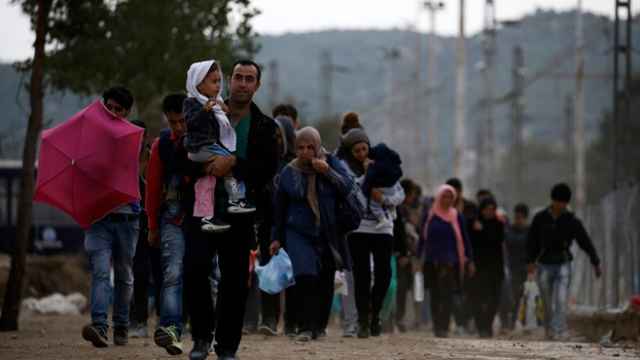 Michele A. Berdy
Michele A. BerdyThe holidays are over, and you are hoping that the price of vegetables has fallen from their are-you-out-of-your-flipping-mind peak on Dec. 31, when eggplants hovered around the 1000-ruble per kilo mark and cucumbers cost as much as platinum. You stop in a grocery shop. The prices have indeed fallen, and that means there's a line — well, not exactly a line, but a lot of people milling about in a loose formation that might, if you squint, approximate a shaggy oblong. You want to know who you are standing behind. So what do you say: Кто последний? (Who's last?) or Кто крайний? (Who's at the end?)
If you want to start a fight, ask that question at a party after everyone has had a few drinks. Half the crowd will insist that "кто крайний" is low-brow and ungrammatical: Это дико режет слух, так как это грубое нарушение правил русского языка (It sounds terrible since it's a gross violation of the rules of the Russian language.) The other half will insist that you should never call someone последний in any context — it's insulting, like you're calling them the last in the class or a loser. And a few will simply say the word is taboo — apparently pilots, mountain climbers, firemen and people in other high-risk professions avoid the word. They don't want to talk about the last anything without knocking on wood and spitting three times over their left shoulder.
So what's the difference between последний and крайний? Who's right?
Последний means the last in any kind of series — последний шанс (last chance), последний день на работе (last day at work), последний раз (last time) and yes: последний в очереди (last in line). It can also mean the end of something: Я отдал свои последние деньги за машину (I paid the last of my money for a car). Or it can mean final: Больше не буду обсуждать этот вопрос. Это моё последнее слово. (I'm not going to discuss that issue anymore. That's my final word.)
In literary contexts, it means "the latter": Пришли Иванов и Сидоров, последний со своей женой (Ivanov and Sidоrov came, the latter with his wife.) Or it can mean the last bit of something: Я готова делиться с ними из последнего (I'm ready to share my last crust of bread with them.)
And in yet other contexts it has the connotation of bad: Он последний негодяй (He's the worst scoundrel). And it can mean a loser: последний парень на деревне (the last guy in the village) means the least successful, least popular, least handsome guy around.
Of course, Russian being Russian, последний can also mean just the opposite: the very latest, most chic, or newest model of something. Я только что купила последнюю модель туфель от Гуччи (I just bought the latest Gucci shoes).
Крайний, on the other hand, means the end or edge of something. Sometimes this is "far" in English: Крайний Север (the Far North); крайняя комната — детская (the farthest room is the nursery.) Or it means something extreme, like крайнее возмущение (extreme indignation). Or something radical, like крайний правый (radical right-wing). Or it means the endpoint to something: крайний срок is the final, absolute last, not-a-second more deadline.
So what do you say in the store? The phrase "Кто последний?" is perfectly correct, but to avoid insulting, spooking, or jinxing anyone, I'm going to say: За кем я буду? (Whom am I behind?)
Michele A. Berdy, a Moscow-based translator and interpreter, is author of "The Russian Word's Worth" (Glas), a collection of her columns.
A Message from The Moscow Times:
Dear readers,
We are facing unprecedented challenges. Russia's Prosecutor General's Office has designated The Moscow Times as an "undesirable" organization, criminalizing our work and putting our staff at risk of prosecution. This follows our earlier unjust labeling as a "foreign agent."
These actions are direct attempts to silence independent journalism in Russia. The authorities claim our work "discredits the decisions of the Russian leadership." We see things differently: we strive to provide accurate, unbiased reporting on Russia.
We, the journalists of The Moscow Times, refuse to be silenced. But to continue our work, we need your help.
Your support, no matter how small, makes a world of difference. If you can, please support us monthly starting from just $2. It's quick to set up, and every contribution makes a significant impact.
By supporting The Moscow Times, you're defending open, independent journalism in the face of repression. Thank you for standing with us.
Remind me later.








